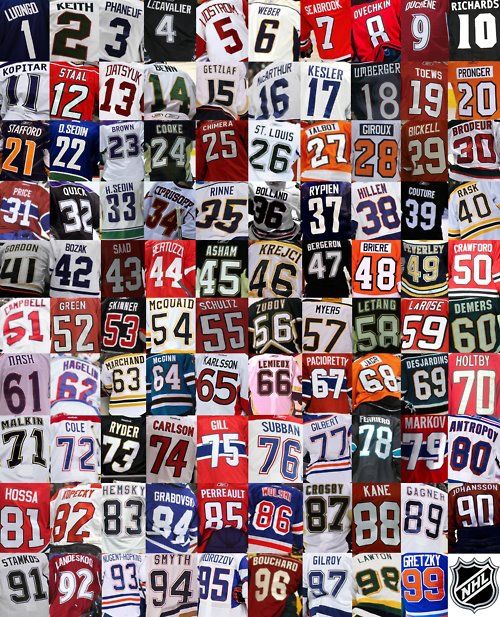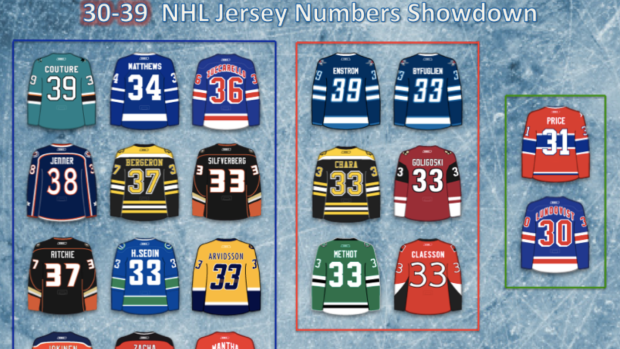Jersey numbers in hockey help identify players on the ice and often carry personal or historical significance. These numbers can become iconic.
Hockey jersey numbers serve more than just identification purposes. Players often choose numbers that hold personal meaning or reflect their role models. Fans also form emotional connections with these numbers, associating them with specific players’ achievements and legacies. Coaches and commentators use these numbers to quickly reference players during games.
For young athletes, wearing the same number as their favorite player can be a source of inspiration. In professional leagues, retired numbers honor legendary players, preserving their legacy. Overall, jersey numbers hold a special place in the culture and history of hockey.

Credit: hockeygods.com
Historical Roots
Jersey numbers in hockey have fascinating historical roots. Their evolution showcases the sport’s rich traditions. Understanding these roots adds depth to the game. Each number tells a story, reflecting its unique history.
Early Practices
In the early days, hockey players didn’t have numbers. They were identified by their position or name. Teams had unique ways to identify players. Some used colored bands or caps. This practice was common in the early 1900s.
Around the 1920s, teams started using numbers. These numbers made it easier to recognize players. Fans and officials could now track players better. Numbers were usually assigned based on position. For instance, goalies often wore number 1.
Evolution Over Decades
The 1930s saw a shift in numbering practices. Players began choosing their own numbers. This allowed for more personal expression. Famous players popularized certain numbers. For example, Wayne Gretzky’s number 99 became iconic.
By the 1950s and 1960s, jersey numbers became standard. Teams assigned numbers to new players more freely. This era saw the birth of legendary jersey numbers. Numbers like 9, 19, and 66 gained fame through star players.
In recent decades, retired numbers became a tradition. Teams honor legendary players by retiring their numbers. This means no one else can wear that number again. It is a way to celebrate the player’s impact on the team.
Symbolism Of Numbers
Jersey numbers in hockey are more than just identifiers. They hold special meanings for players and teams. This adds a layer of significance to the game.
Personal Meaning
For many players, their jersey number has a personal meaning. It might be a lucky number or one they have worn since childhood. Some players choose numbers to honor a family member or a mentor.
Here are some examples:
- Wayne Gretzky wore #99 because his idol wore #9.
- Sidney Crosby wears #87 because he was born in 1987.
Team Traditions
Teams also have their own traditions with jersey numbers. Some numbers may be retired to honor past players. Other numbers might be passed down to keep a legacy alive.
Consider these traditions:
| Team | Retired Number | Honored Player |
|---|---|---|
| Montreal Canadiens | #10 | Guy Lafleur |
| Detroit Red Wings | #9 | Gordie Howe |
Iconic Jersey Numbers
In hockey, jersey numbers hold a special place. They are more than just a way to identify players on the ice. Iconic jersey numbers carry a rich history and symbolize the greatness of legendary players. They inspire new generations and create lasting memories for fans. Let’s dive into some of these iconic jersey numbers and their significance.
Legendary Players
Certain jersey numbers are forever linked with the greatest hockey players of all time. Here are a few examples:
| Player | Number | Team |
|---|---|---|
| Wayne Gretzky | 99 | Edmonton Oilers |
| Bobby Orr | 4 | Boston Bruins |
| Mario Lemieux | 66 | Pittsburgh Penguins |
| Gordie Howe | 9 | Detroit Red Wings |
These players made their jersey numbers famous. Wayne Gretzky’s 99 is perhaps the most iconic. No other player can wear this number in the NHL. Bobby Orr’s 4 is synonymous with defense excellence. Mario Lemieux’s 66 stands for skill and courage. Gordie Howe’s 9 represents toughness and longevity.
Retired Numbers
When a team retires a jersey number, it means no other player on that team can wear it again. This is a great honor and a sign of respect. Here are some examples:
- Wayne Gretzky’s 99 – Retired league-wide
- Bobby Orr’s 4 – Retired by the Boston Bruins
- Mario Lemieux’s 66 – Retired by the Pittsburgh Penguins
- Gordie Howe’s 9 – Retired by the Detroit Red Wings
Retiring a number ensures that the player’s legacy lives on. Fans remember the great moments associated with that number. It also sets a standard for future players.
Choosing A Number
In hockey, jersey numbers carry a special significance. They often reflect a player’s journey and personality. Choosing a number is an important decision for both rookies and veterans. This choice can influence a player’s identity and legacy.
Rookie Selection
Rookies often face limited options when selecting their jersey numbers. Many established players have already claimed popular numbers. Rookies might choose numbers based on availability or personal reasons.
Here are some factors rookies consider:
- Availability: Popular numbers might be taken.
- Role Models: Rookies sometimes pick numbers worn by their idols.
- Luck: Some believe certain numbers bring good fortune.
Veteran Preference
Veterans usually have more freedom in their number choice. Their experience and status often grant them priority. Veterans may stick with a number they have worn throughout their career.
Common reasons for veteran number choices include:
- Sentiment: A number might hold personal or sentimental value.
- Legacy: Veterans often aim to create a legacy with their number.
- Consistency: Keeping the same number can symbolize stability and reliability.
Some veterans even change numbers to mark a new chapter in their career.
Fan Culture
Jersey numbers hold special meaning in hockey fan culture. They help fans connect with their favorite players. These numbers become symbols of loyalty and pride.
Merchandising Impact
Jersey numbers drive merchandise sales. Fans buy jerseys with their favorite player’s number. This strengthens their bond with the team.
- Numbered jerseys are top sellers.
- Fans feel pride wearing player numbers.
- Merchandising boosts team revenue.
Special edition jerseys with unique numbers often sell out fast. Limited releases create excitement among fans. This creates a strong demand in the market.
Fan Identification
Jersey numbers help fans identify players quickly. It is easier to spot players on the ice. This enhances the viewing experience.
Fans often choose numbers that mean something to them. For example, a birthday or a lucky number. This personal connection strengthens their love for the game.
| Player | Number | Team |
|---|---|---|
| Wayne Gretzky | 99 | Edmonton Oilers |
| Mario Lemieux | 66 | Pittsburgh Penguins |
| Sydney Crosby | 87 | Pittsburgh Penguins |
Fans also use player numbers in usernames and social media. This shows their support and admiration for the players. It creates a sense of community among fans.
Numbers And Superstition
Jersey numbers in hockey hold a special meaning for players. Many believe numbers can bring good or bad luck. This belief often guides their choices.
Lucky Numbers
Some hockey players choose their numbers based on luck. A player might pick number 7 because it is thought to be lucky. The number 9 is also popular. It is often linked to famous players like Gordie Howe.
Here is a list of popular lucky numbers in hockey:
- 7 – Considered a lucky number in many cultures
- 9 – Associated with hockey legends
- 19 – Used by many successful players
Avoided Digits
Some numbers are avoided due to superstition. Players may think these numbers bring bad luck. For example, number 13 is often skipped. Many players and teams do not use it.
Below is a table of numbers often avoided:
| Number | Reason |
|---|---|
| 13 | Considered unlucky in many cultures |
| 66 | Rarely used, sometimes linked with bad luck |
Players may also avoid numbers if they have bad personal experiences. This shows how deeply superstition can influence choices.
Jersey Numbers In Modern Era
Jersey numbers in hockey carry significant meaning. In the modern era, these numbers have evolved. They represent more than just player identification. They embody trends, player influences, and team dynamics.
Current Trends
Current trends in jersey numbers show unique choices. Players now choose numbers based on personal significance. Some prefer high numbers. Others stick to traditional ones.
A few teams have retired numbers. This honors legendary players. It also creates a sense of history. Numbers like 99 are iconic and rare.
Many young players emulate their idols. They pick similar numbers. This trend brings continuity. It also creates a connection between past and present.
Influence Of Popular Players
Popular players have a big influence on jersey numbers. Wayne Gretzky’s 99 is a prime example. His number is synonymous with greatness. Young players often aspire to his legacy.
Sidney Crosby’s 87 is another influential number. He chose it for his birth year. His success made 87 popular.
A table can show influential numbers:
| Player | Number | Reason |
|---|---|---|
| Wayne Gretzky | 99 | Iconic choice, widely respected |
| Sidney Crosby | 87 | Birth year, personal significance |
| Alexander Ovechkin | 8 | Lucky number, personal preference |
Influence extends beyond the rink. Fans wear jerseys with these numbers. It shows support and admiration. This trend boosts merchandise sales. It also strengthens the player’s brand.

Credit: blpa.com
Global Perspective
Jersey numbers in hockey go beyond mere identifiers. They hold deep significance and vary widely across the globe. This section explores the global perspective on hockey jersey numbers.
International Variations
Different countries have unique traditions regarding jersey numbers in hockey. In North America, players often choose numbers based on personal preference or superstition. In contrast, European leagues may assign numbers based on position or seniority.
For example, Canadian players often favor numbers like 99 and 66, honoring legends like Wayne Gretzky and Mario Lemieux. In Russia, numbers like 1 and 20 are popular among goalkeepers. These variations add a rich cultural layer to the sport.
Cultural Differences
Cultural differences play a significant role in the choice of jersey numbers. In some cultures, certain numbers are considered lucky or unlucky. For instance, in China, the number 8 is seen as lucky and is highly sought after. In Western cultures, numbers like 13 are often avoided due to superstitions.
Fans also attach meanings to specific numbers. For example, wearing 99 in North America is a tribute to Wayne Gretzky. In Sweden, the number 21 is iconic due to Börje Salming. These cultural nuances make jersey numbers an integral part of hockey’s identity.
| Country | Popular Numbers | Reason |
|---|---|---|
| Canada | 99, 66 | Honoring Legends |
| Russia | 1, 20 | Position Preference |
| China | 8 | Lucky Number |
| Sweden | 21 | Tribute to Börje Salming |
These international and cultural differences make hockey jersey numbers unique and meaningful. They contribute to the sport’s rich history and global appeal.

Credit: www.bardown.com
Frequently Asked Questions
What Do Hockey Jersey Numbers Mean?
Hockey jersey numbers help identify players on the ice. They often have personal or historical significance. Some numbers are retired to honor legendary players.
Why Do Some Hockey Players Choose Specific Numbers?
Players choose specific numbers for personal reasons. It could be a tribute to a role model or a lucky number.
Are Certain Hockey Jersey Numbers Retired?
Yes, many teams retire numbers to honor legendary players. These numbers are no longer used by other players on the team.
Do Jersey Numbers Affect A Player’s Position?
No, jersey numbers do not dictate a player’s position. They are chosen based on personal preference or team tradition.
Conclusion
Jersey numbers in hockey hold deep significance. They honor legends, inspire players, and build team identity. Understanding their importance enriches the fan experience. Next time you watch a game, notice the numbers. They tell stories of past and present players, connecting fans to the sport’s rich history.

